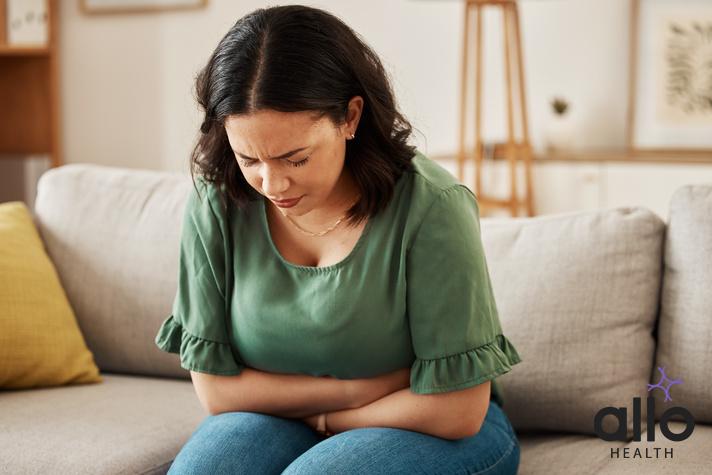Sharp Pain In Anus And Lower Abdomen In Females After Intercourse: Causes and Treatments

Allo Health is dedicated to personalized well-being, offering support and trusted information tailored to individual health goals. The platform emphasizes human-generated content, led by a distinguished medical team of experts, including physicians and sexual health specialists. Their commitment to credibility involves rigorous fact-checking, authoritative research, and continuous updates to ensure accurate, up-to-date information. Allo Health's unique approach goes beyond conventional platforms, providing expert-led insights and a continuous commitment to excellence, with user feedback playing a crucial role in shaping the platform's authoritative voice.

Dr. Aswathi P T earned her MBBS degree and completed her internship at Government Medical College, Kozhikode, and possess diverse professional background spanning 3.5 years. Her experience includes a wide range of healthcare settings, including health centers, hospitals, and teleconsultation services.
Why This Was Upated?
Our experts continually monitor the health and wellness space, and we update our articles when new information became available.
Updated on 29 July, 2024
- Article was updated as part of our commitment to diversity, equity, and inclusion.
"The following blog article provides general information and insights on various topics. However, it is important to note that the information presented is not intended as professional advice in any specific field or area. The content of this blog is for general educational and informational purposes only.
Book consultation
The content should not be interpreted as endorsement, recommendation, or guarantee of any product, service, or information mentioned. Readers are solely responsible for the decisions and actions they take based on the information provided in this blog. It is essential to exercise individual judgment, critical thinking, and personal responsibility when applying or implementing any information or suggestions discussed in the blog."
For many women, sexual intercourse is an enjoyable and fulfilling experience, but for some, it can bring about sharp pain in the anus and lower abdomen afterwards. This pain can be very uncomfortable and can affect a woman’s quality of life. In this article, we will discuss the possible causes of this pain and the treatment options available.
What Is Pain After Intercourse Called?
Pain after intercourse, also known as dyspareunia, is a term used to describe persistent or recurrent pain that occurs during or after sexual activity. It is important to recognize that dyspareunia can affect both men and women, but it is more commonly reported by women.
Causes of Dyspareunia:
- Physical Causes:
- Infections: Genital infections, including sexually transmitted infections (STIs), can cause pain after intercourse.
- Vaginal Dryness: Insufficient lubrication can lead to friction and discomfort. This may be related to hormonal changes, medications, or insufficient arousal.
- Endometriosis: This condition involves the growth of uterine tissue outside the uterus, and it can cause pain during and after intercourse.
- Structural Causes:
- Uterine Fibroids: Non-cancerous growths in the uterus may contribute to pain during intercourse.
- Ovarian Cysts: Fluid-filled sacs on the ovaries can cause discomfort, especially during sexual activity.
- Psychological Causes:
- Stress and Anxiety: Psychological factors, such as stress, anxiety, or a history of trauma, can contribute to pain during intercourse.
- Relationship Concerns: Emotional factors and relationship concerns may impact sexual well-being.
- Medical Treatments:
- Certain medical treatments, such as radiation or chemotherapy, can cause changes in the genital area leading to pain during or after intercourse.
- Postmenopausal Changes:
- Reduced estrogen levels after menopause can result in vaginal dryness and thinning of the vaginal walls, leading to pain during intercourse.
Treatment for Dyspareunia:
- Medical Intervention:
- Treatment depends on the underlying cause. Infections may require antibiotics, while hormonal imbalances may be addressed with medications.
- Surgical interventions may be considered for conditions like endometriosis, fibroids, or cysts.
- Lifestyle and Behavioral Changes:
- Using water-based lubricants, practicing relaxation techniques, and communicating openly with your partner can help alleviate discomfort.
- Pelvic Floor Physical Therapy:
- For individuals with muscle-related concerns, pelvic floor physical therapy may be recommended to address muscle tension or spasms.
It’s crucial to consult with a healthcare professional to determine the specific cause of dyspareunia and to develop an appropriate treatment plan tailored to individual needs. Open communication with your healthcare provider is key to addressing and managing pain after intercourse effectively.

Sharp Pain In Anus And Lower Abdomen In Females After Intercourse Causes
There are several potential reasons why someone might experience sharp pain in the anus and lower abdomen after intercourse. If you are experiencing persistent or severe pain, you should seek medical advice from a healthcare professional for an accurate diagnosis and appropriate treatment.
- Anal Fissures: Small tears or cuts in the lining of the anus can occur, causing sharp pain, especially during bowel movements or intercourse.
- Hemorrhoids: Swollen and inflamed blood vessels in the rectum or anus can cause discomfort and pain, exacerbated by activities such as intercourse.
- Infections: Infections in the genital or anal area, such as sexually transmitted infections (STIs), can cause pain during or after intercourse.
- Endometriosis: This is a condition where tissue similar to the lining of the uterus grows outside the uterus. It can cause pain during and after intercourse, particularly in the lower abdomen.
- Pelvic Inflammatory Disease (PID): An infection of the female reproductive organs, often caused by sexually transmitted bacteria, can lead to pelvic pain and discomfort.
- Ovarian Cysts: Fluid-filled sacs on the ovaries can cause pain, especially during intercourse if there is pressure on the pelvic region.
- Uterine Fibroids: Non-cancerous growths in the uterus can cause pain or discomfort, particularly during sexual activity.
- Muscle Spasms: Spasms in the pelvic floor muscles may occur, causing pain during or after intercourse.
- Gastrointestinal Concerns: Conditions like irritable bowel syndrome (IBS) or inflammatory bowel disease (IBD) may cause pain in the lower abdomen and can be aggravated by intercourse.
- Psychological Factors: Anxiety, stress, or psychological factors can contribute to pain during intercourse, leading to tension and discomfort.
It’s crucial to consult with a healthcare professional to determine the exact cause of the pain. They may perform a physical examination, order tests, or conduct imaging studies to make an accurate diagnosis. Treatment will depend on the underlying cause, and your healthcare provider can recommend appropriate measures to address the concern.
Sharp Pain In Anus And Lower Abdomen In Females After Intercourse Treatments
The appropriate treatment will depend on the underlying cause of the pain.
- Anal Fissures: Over-the-counter creams or ointments containing numbing agents or steroids may help alleviate pain and promote healing. Increasing fiber intake and staying hydrated can soften stools and reduce strain during bowel movements.
- Hemorrhoids: Warm sitz baths, over-the-counter creams, and lifestyle modifications such as increasing fiber intake and maintaining good hygiene can help manage symptoms. Severe cases may require medical procedures like rubber band ligation or surgical removal.
- Infections: Treatment depends on the specific infection. Bacterial infections may require antibiotics, while antiviral medications may be necessary for viral infections. STIs often require specific medications, so it’s crucial to see a healthcare professional for proper diagnosis and treatment.
- Endometriosis: Management may include pain medications, hormonal therapies, or, in severe cases, surgery to remove endometrial tissue.
- Pelvic Inflammatory Disease (PID): PID is typically treated with antibiotics. It’s important to complete the entire course of prescribed antibiotics to ensure the infection is fully eradicated.
- Ovarian Cysts: Small cysts may resolve on their own, while larger or persistent cysts might require medical intervention. Treatment options range from hormonal contraceptives to surgery, depending on the severity.
- Uterine Fibroids: Treatment options include medications to control symptoms or surgery (myomectomy or hysterectomy) for more severe cases.
- Muscle Spasms: Physical therapy, relaxation techniques, and exercises to relax and strengthen the pelvic floor muscles may be recommended.
- Gastrointestinal Concerns: Management may involve dietary changes, medications to control symptoms (such as antispasmodics for IBS), and lifestyle modifications.
- Psychological Factors: If psychological factors contribute to pain during intercourse, counseling or therapy may be beneficial. Stress management techniques and communication with your partner can also be helpful.
Always consult with a healthcare professional for personalized advice based on your specific situation. It’s essential to address the underlying cause of the pain to ensure appropriate and effective treatment.
Most Asked Questions
-
Why do I experience sharp pain in the anus and lower abdomen after intercourse?
Sharp pain post-intercourse can be due to various reasons such as anal fissures, hemorrhoids, infections, endometriosis, or pelvic inflammatory disease. It's crucial to identify the specific cause through a medical examination.
-
Can anal fissures cause pain during and after intercourse?
Yes, anal fissures, small tears in the anus lining, can lead to sharp pain during and after intercourse. Over-the-counter creams and lifestyle adjustments like increased fiber intake may help manage symptoms.
-
What should I do if I suspect a sexually transmitted infection (STI) is causing the pain?
Seek immediate medical attention for proper diagnosis and treatment if you suspect an STI. Antibiotics or antiviral medications may be necessary, and your partner should also be informed and tested.
-
Are there at-home remedies for managing pain associated with ovarian cysts or uterine fibroids?
While at-home measures like warm compresses can offer temporary relief, it's essential to consult a healthcare professional for a proper diagnosis. Treatment may include medications, hormonal therapy, or, in severe cases, surgical intervention.
-
Can psychological factors contribute to pain during intercourse?
Yes, psychological factors like stress and anxiety can contribute to pain during intercourse. Seeking counseling or therapy, practicing relaxation techniques, and open communication with your partner may help address these factors.











































